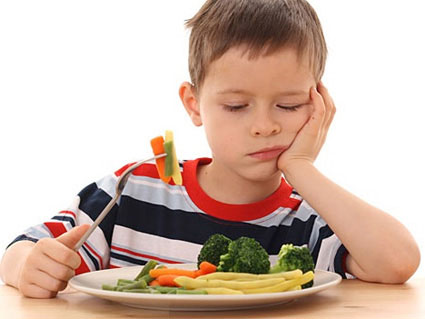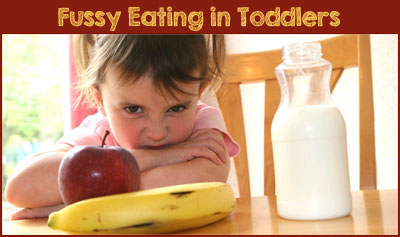Everyone knows someone – young or old – who has a whole list of food they refuse to eat or worse, a tiny list of foods that they do eat! We term them as “picky eatersâ€, but guess what...Picky eaters are not born. They are encouraged to be fussy about their food by their unsuspecting parents. Find tips to inculcate good eating habits in your children and learn how to deal with picky eaters here. Let us face it:
Feeding children can really be a challenging task and no matter how much time you spend in the kitchen trying to make healthy dishes tasty for your kids, the verdict always ranges from 'not hungry' to ‘looks yucky' or 'will eat later'. When they refuse to eat certain food items placed before them, we let them get their way and give them what they want simply because we are worried that they will remain hungry because of their stubbornness.
At times, we beg, we plead, we threaten, we bribe...But it does not work. Your child wants what he wants, and only what he wants! But did you know? Studies show that it takes 8 to 10 tries to introduce new food to babies before they begin to like it! Stay strong. Do not give in to their tantrums. Be patient and offer bite-sized portions for them to taste as a side dish along with their regular meals until they begin to like the taste of the new dish.
Find the top ten tips to guide parents to deal with picky eaters and inculcate good eating habits in children below:
1. Start By Stopping Comparisons
Just because your neighbour's child eats a plate of salad with each meal and never fusses about chicken sandwich with greens does not mean that yours would also. Comparisons make eating about competition, and when you try to force your child to eat something healthy simply because his friend eats it, your child will begin to harbour negative feelings towards that dish even if he liked the taste of that dish.
2. Set An Example
Look at your own eating habits. Are you or your spouse a fussy eater? You will notice that often, you do not eat certain dishes, or eat something different from what the rest of the family is eating. Your child notices all his, and takes your behaviour to mean that it is acceptable to not eat what is placed in front of you. He comes to the conclusion that it is okay to have preferences for certain foods and to reject other food. If you choose French fries over vegetables, why should your child do any different?
3. Avoid Giving Options
Once on the dining table, you need to ensure that your child is served the same dishes that are served to everybody else. Avoid including too many food items in your menu. No family member should be given special treatment where food is concerned. If your child notices that your husband wants a paratha with his vegetables instead of chappatis like everyone else, what is going to stop your child from demanding pasta when everyone is having rice? That does not mean that you turn a deaf ear to all food requests. Take into account everyone’s request and fulfil them day by day. Simply ensure that while your husband may be the one who requested pizzas, everyone else at the table is also served pizzas for that meal. If the child refuses to eat what is served, hoping to get something of his choice as a snack later, try converting what you had made for dinner into a snack, but refuse to give him something new for a snack.
4. Do Not Brand Fast Food as Bad Food
Do not completely refuse the entry of fast food in your house or create a big uproar about it. Treating it just like any other food item and convincing your kids that these foods can be had but only in small proportions and only after finishing their snacks is advisable. Keep them reserved only for special occasions, rather than banning their entry into the house, which can end up making their desirable quotient higher, especially considering the presence of fast food everywhere.
5. Involve Children in the Planning and Preparing of Meals
Take your children grocery shopping! Ask them to choose what vegetable you should cook today. By doing so, you are making it clear that some vegetable is definitely going to be part of the meal, but they have the option to choose the vegetable they wish to eat. Let them help you in preparing the meal, so that not only are they excited to show the family that they have helped prepare the meal, but they also realise the effort that goes into preparing a meal. Allow them to set the table or wash fruits and vegetables, anything that makes them feel involved in the cooking process.
6. Do Not use Food as a Reward or Punishment
It is a common tendency of parents to treat kids with chocolates or punish them by withdrawing their favourite food from the menu. Avoid this behaviour completely as food should ideally never be used to shape behaviour or build character. These usually do not work out in the long run as the message which goes out is that you may misbehave, but you cannot eat your favourite food or in a way misbehaving is acceptable till you agree not to have a particular food.
7. Minimise Intake of Drinks Around Mealtime
Kids often fill their stomachs with liquids and then refuse to eat. Sodas and juices are not only nutritionally void, but can also be dehydrating. Water is always a better fluid choice for drinking. If you wish to give your child some fruit juice, ensure that it is freshly extracted or 100 percent pure juice. Serve juice in place of a snack instead of making it a part of proper meal time so as to ensure proper digestion of the juices and proper eating during mealtime.
8. Eat Together
Enthusiasm for good food can be infectious. Households where cooking and sitting down for meals is part of daily family life is normally where the children eat well and appreciate variety in their dishes. They take adults as their role models and are more likely to imitate their eating habits. It is of utmost importance that you yourself eat healthy and display good dinning manners if you want your child to do so. Moreover, if you put all your focus towards feeding your child, your toddler may make refusal of eating as a means to keep your attention on him for longer. Instead, sit next to him, feed him but also feed yourself simultaneously so that he tries to imitate you.
9. Make Mealtime, Fun Time
Hand over a sheet of paper and a few crayons to your toddler or read out a story book to your pre-schooler to help divert his attention and make him look forward to mealtime. Instead of trying to force baked beans and fruits down your child's throat, give him some freedom to choose either the food or the amount to be eaten from time to time. This will add joy to the eating process and making mealtime fun. Buy bright coloured dish wares, cut interesting shapes and sizes for sandwiches, give funny names to dishes or arrange foods on plates in a creative pattern.
10. Be Considerate of Their Appetite
If your child says he is not hungry, do not force him to eat. Your child knows when he is hungry and let him go to bed on an empty stomach if he claims to not be hungry. Do not give him biscuits just because he is not hungry enough to have dinner. If he is not hungry to have dinner, he definitely should not be hungry for biscuits! Offer him a snack of the same food a little while later. Forcing, threatening or bribing your child to eat when he claims not to be hungry, will only start a power struggle of sorts as your child will realise that refusal to eat not only gets you his undivided attention but also gives him more leverage to ask for his favourite food. Be firm and he will soon realise that when he says he is not hungry, you will accept it. He will begin to respect his own appetite and ask and sit down for meals without struggle.
So, remember to be patient and firm with your child to get him to eat what is prepared and is healthy for him. Stick to a daily routine and do not offer him any kind of food outside of the routine even if he has skipped a meal. When introducing new foods to his palate, start slow and offer only a little to taste time and time again, until he, himself, asks to be served more than a bite-sized portion. If you are worried about whether or not your child is getting healthy nutrition, keep a food log and let your doctor browse through it for suggestions to what should be incorporated or removed from your child’s diet. Picky or fussy eating habits will not change overnight but working towards the goal slowly and steadily will ensure that your child grows up with a lifelong habit of healthy eating!
Find tips to Pack a Tasty Tiffin here.
Is your child eating right? What kind of food does your child like to eat? Do you find it difficult to feed your child? Discuss here. 












 By - Dr. Panchali Moitra (Woman and Child nutrition Expert)
By - Dr. Panchali Moitra (Woman and Child nutrition Expert)


















